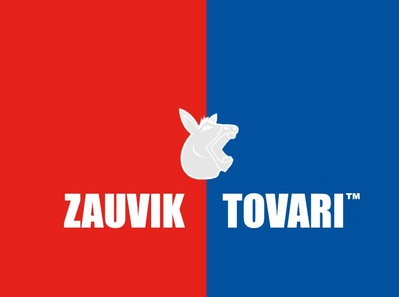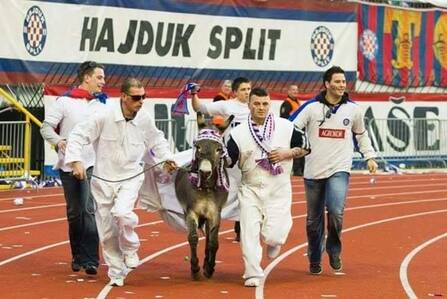Vocabulary: Što je korijen riječi? #001NadimakAccording to Bujas in the Veliki Hrvatsko-Engleski Rječnik, treće izdanje: In my experience, there were so many people in my father's home town of Zastražišće (na otoku Hvaru) who had the same name, (like Jure Mateljan, or Ante Barbarić) that each was distinguished from others of the same name by using a nadimak. One man had such a large distinguishing feature on his face that he was commonly referred to by the nickname Nosić. I suspect that would be unacceptable now? And I recall that there was a George (Jure) Barbarić who was known as "Palada", or something similar. That was a long time ago, so I don't know exactly what this nadimak meant - in fact, I didn't know that it was in fact a nadimak, and not his real name. I wonder what it meant? Can anybody help me here? It would be interesting to know. As would some other examples.
It's time to address the root of the word nadimak. I have always thought that this is a rather curious word, and it didn't come to easily me when I was searching for it.
In trying to make sense of the word nadimak, I recall that I sometimes searched for its root by breaking it up as
na - dim - ak
Dim? Smoke? No, no obvious connection .....
And then one day, I saw it (Duh!):
nad - im - ak
nad, meaning "over".
im, from ime (name) ak, a common suffix, as in desetak, napredak, postotak, .... A name over and above (the real name)! How obvious! And now it is so easy to recall. There are so many pathways in this business of learning Croatian, zar ne?
CORRECTION
Since writing above about my take on the origin of the word nadimak, I have discovered an entry in Wikipedia: Riječ je sastavljena od riječi nadjeti (dati) i ime. The word (nadimak) is composed of the words nadjeti (to give) and ime (name) Aha! A given name .... That makes sense. Even though I now have a more probable origin of the word nadimak, I won't delete my own musings above, because that is helpful too.
CORRECTION TO THE CORRECTION
Why is everything so slippery? Mateja told me that she does not know of a word nadjeti, and indeed there is no entry in Wiktionary. She suggested that it should be nadjenuti - confirmed by an entry in Wiktionary that you can inspect. So finally (maybe): The word (nadimak) is composed of the words nadjenuti and ime.
To check the declension of the noun nadimak (that is, how the endings of the word change, according to case) I think that the best source is the appropriate page in Wiktionary.
By the way, just for example, here are some nadimci used in Croatia:
For the people of Zagreb, the nadimak Purgeri is often used. There is an obvious commonality with the word "burgher". Players of the Dinamo Zagreb football club are called Modri. Do you know why? And sometimes Purgeri. Their great opponents, the players of Hajduk Split football club have the nadimak Bili. Think of what the Croatian word for “white” might be in Dalmatian dialect …. And the supporters of Hajduk (who belong to the group Torcida), are given the nadimak Tovari. I suspect that this is often used in a derogatory sense, but the Hajduk fans have embraced the symbol, as we see in the following images:
The first image is taken from https://www.facebook.com/ZauvikTovari/.
The second is taken from an official Facebook site Hajduk kroz povijest.
In Dalmacija, the tovar, or magarac, is held in high regard for the contribution that this animal has made to rural life through the centuries.
There is even a statue of a donkey in a prominent position on the riva in Jelsa, on the island Hvar. This is the subject of another post in this website (Where? What? Who? 006). At the time of installation of the donkey statue in Jelsa, the newspaper Slobodna Dalmacija published a very interesting article on the status of the tovar on the islands, entitled Škrmetin tovar za povijest Jelse. You might need a translator. I did, and it was well worth it.
The people of the various regions of Croatia also have been given nadimci.
To Dalmatians, the two most relevant are Boduli, for those who live on the islands or on the coast, and Vlasi (or Vlaji) for those who live in the mountainous hinterland in from the coast. We will explore these terms and their origins in another post (Please remind me.). The daily newspaper Večernji List, has published an article Ma znate što?! Vi ste svi Vlaji, boduli, Gedže, balije, kauri, žabari, šljivari... that discusses the origins of these nadimci.
And people's names? Epithets are common in every language, but it seems that Croatians run amok with nadimci. For example ....
Guys with the name Ivan might be called any of Ivo, Ive, Ivica, Ivko, Ivanko, Iveša, Ino, or Ico. And Ivana is likely to have the nadimak Iva, Ive, Ina, Ivančica, Ivka, or Ivuša. I'm sure that you know many more - For Peter, Ante, Josip, Stjepan, Marija, Ana, and Katarina, i tako dalje. And even the Republic of Croatia has a nadimak: Lijepa naša. Where does that come from? (Hint) Did I digress a little from the discussion of the korijen of the word nadimak? I know that I did, but with every thought I am learning Croatian, and I hope that you might be taking little steps with me also.
Getting around
You can browse or search this website in the following ways:
AHA! Learning Croatian with Bob
Correspondence: [email protected]
0 Comments
|


